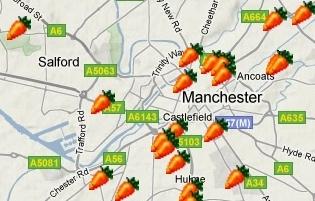
A Sustainable Food Directory for Greater Manchester is taking shape after Kindling made its fledgling database of sustainable food projects available on-line. With over a hundred and fifty independent businesses, voluntary organisations and community groups listed into categories like primary producers (e.g. growers), secondary producers like bakers; retailers, community projects and support services, the directory can be searched by name, type and location. Additionally, a map allows for easy searching.
The information was compiled over a year ago with the support of Manchester Food Futures and has been extensively updated over the last few months. Technical issues delayed the uploading and FeedingManchester attendees have been waiting patiently for its launch.
The research (carried out in the spring of 2009) identified over 150 sustainable food projects, totaling a turnover of well over £3 million and supporting and engaging over 100,000 people each year. And since the interest in sustainability has continued and Local Food Funding has been supporting numerous projects in the region, this has surely increased.
Examples of directory content include Bolton Wholefoods Cooperative; Albion Farm Shop in Oldham; Debdale Eco Centre in East Manchester, Hulme Community Garden Centre; Glebelands City Growers in Trafford; Ordsall Community Cafe in Salford and Clover Bank Farm.
The next stage is to create a forum to allow groups and individuals to communicate and discuss issues with each other and to offer more information about each group like what they grow, what they sell, opening times, volunteering opportunities etc.
The OpenSouce database that hosts the directory will eventually form the basis of a new site, totally independent of Kindling, owned and managed collectively by the sustainable food projects in the directory, ensuring the information is available to everyone and regularly updated. Over 200 custom fields have been added to the database, but this is divided by sector so each group should only have to fill in 40-50 text fields or tickboxes. The hope is to collect information over what is grown/sold what resources might be shared in order to better coordinate activities between groups and increase sustainable food in Manchester.
We have extensively updated the information that was collected over a year ago, but if you find any errors please let us know as we are in the process of emailing each group asking them to check their contact details and description
Finally, a belated public thank you to Amy Shadbolt who collated much of the information and Food Futures who helped fund the research.
To visit the directory click here.
